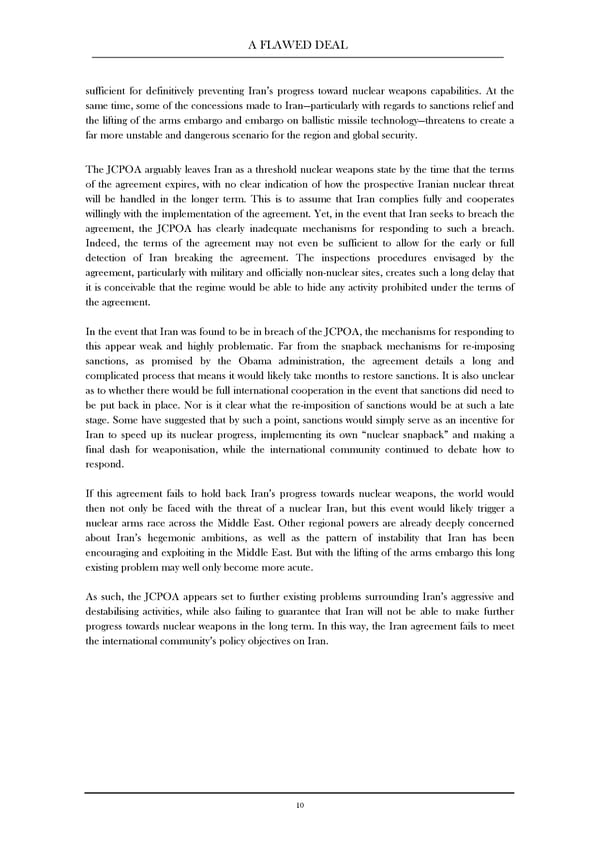! A FLAWED DEAL sufficient for definitively preventing Iran’s progress toward nuclear weapons capabilities. At the same time, some of the concessions made to Iran—particularly with regards to sanctions relief and the lifting of the arms embargo and embargo on ballistic missile technology—threatens to create a far more unstable and dangerous scenario for the region and global security. The JCPOA arguably leaves Iran as a threshold nuclear weapons state by the time that the terms of the agreement expires, with no clear indication of how the prospective Iranian nuclear threat will be handled in the longer term. This is to assume that Iran complies fully and cooperates willingly with the implementation of the agreement. Yet, in the event that Iran seeks to breach the agreement, the JCPOA has clearly inadequate mechanisms for responding to such a breach. Indeed, the terms of the agreement may not even be sufficient to allow for the early or full detection of Iran breaking the agreement. The inspections procedures envisaged by the agreement, particularly with military and officially non-nuclear sites, creates such a long delay that it is conceivable that the regime would be able to hide any activity prohibited under the terms of the agreement. In the event that Iran was found to be in breach of the JCPOA, the mechanisms for responding to this appear weak and highly problematic. Far from the snapback mechanisms for re-imposing sanctions, as promised by the Obama administration, the agreement details a long and complicated process that means it would likely take months to restore sanctions. It is also unclear as to whether there would be full international cooperation in the event that sanctions did need to be put back in place. Nor is it clear what the re-imposition of sanctions would be at such a late stage. Some have suggested that by such a point, sanctions would simply serve as an incentive for Iran to speed up its nuclear progress, implementing its own “nuclear snapback” and making a final dash for weaponisation, while the international community continued to debate how to respond. If this agreement fails to hold back Iran’s progress towards nuclear weapons, the world would then not only be faced with the threat of a nuclear Iran, but this event would likely trigger a nuclear arms race across the Middle East. Other regional powers are already deeply concerned about Iran’s hegemonic ambitions, as well as the pattern of instability that Iran has been encouraging and exploiting in the Middle East. But with the lifting of the arms embargo this long existing problem may well only become more acute. As such, the JCPOA appears set to further existing problems surrounding Iran’s aggressive and destabilising activities, while also failing to guarantee that Iran will not be able to make further progress towards nuclear weapons in the long term. In this way, the Iran agreement fails to meet the international community’s policy objectives on Iran. 10 ! !
 A Flawed Deal Page 12 Page 14
A Flawed Deal Page 12 Page 14